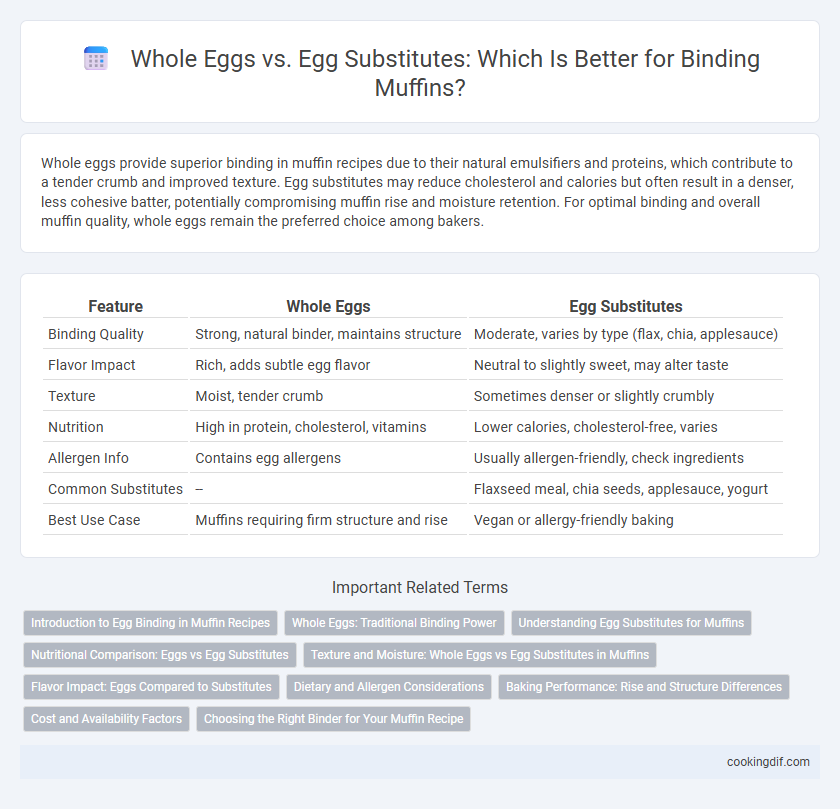Whole eggs provide superior binding in muffin recipes due to their natural emulsifiers and proteins, which contribute to a tender crumb and improved texture. Egg substitutes may reduce cholesterol and calories but often result in a denser, less cohesive batter, potentially compromising muffin rise and moisture retention. For optimal binding and overall muffin quality, whole eggs remain the preferred choice among bakers.
Table of Comparison
| Feature | Whole Eggs | Egg Substitutes |
|---|---|---|
| Binding Quality | Strong, natural binder, maintains structure | Moderate, varies by type (flax, chia, applesauce) |
| Flavor Impact | Rich, adds subtle egg flavor | Neutral to slightly sweet, may alter taste |
| Texture | Moist, tender crumb | Sometimes denser or slightly crumbly |
| Nutrition | High in protein, cholesterol, vitamins | Lower calories, cholesterol-free, varies |
| Allergen Info | Contains egg allergens | Usually allergen-friendly, check ingredients |
| Common Substitutes | -- | Flaxseed meal, chia seeds, applesauce, yogurt |
| Best Use Case | Muffins requiring firm structure and rise | Vegan or allergy-friendly baking |
Introduction to Egg Binding in Muffin Recipes
Whole eggs provide natural proteins and fats essential for binding muffin batter, improving texture and moisture retention during baking. Egg substitutes, often made from plant-based ingredients like flaxseed or aquafaba, offer alternative binding without cholesterol, catering to dietary restrictions and allergies. Understanding the binding properties of whole eggs versus substitutes helps optimize muffin consistency and structural integrity.
Whole Eggs: Traditional Binding Power
Whole eggs provide superior binding power in muffins due to their natural combination of proteins and fats, which create structure and moisture retention during baking. The lecithin in egg yolks acts as an emulsifier, ensuring even distribution of ingredients and a tender crumb. Compared to egg substitutes, whole eggs contribute to better rise and richer texture, making them the preferred choice for traditional muffin recipes.
Understanding Egg Substitutes for Muffins
Egg substitutes for muffins often include options like applesauce, mashed bananas, flaxseed meal, or commercial egg replacers, providing moisture and binding without the cholesterol found in whole eggs. These alternatives vary in texture and taste, with flaxseed offering a nutty flavor and applesauce contributing sweetness, making them suitable for different muffin recipes depending on desired consistency. Understanding the binding properties and moisture content of each substitute helps achieve optimal muffin structure and prevents crumbliness or excessive density.
Nutritional Comparison: Eggs vs Egg Substitutes
Whole eggs provide approximately 70 calories, 6 grams of protein, and essential nutrients like vitamin B12 and choline per large egg, contributing to muffins' structure and moisture. Egg substitutes often contain fewer calories and less fat while increasing sodium content, with some options offering added fiber but lacking the complete protein profile of whole eggs. Choosing between whole eggs and substitutes impacts muffins' nutritional value, protein content, and texture, influencing both flavor and dietary suitability.
Texture and Moisture: Whole Eggs vs Egg Substitutes in Muffins
Whole eggs provide superior binding in muffins, contributing to a rich, moist texture and enhanced crumb structure due to their natural fats and proteins. Egg substitutes, often made from plant-based ingredients or egg whites, can result in a denser, less tender muffin with reduced moisture retention. For optimal texture and moisture, whole eggs remain the preferred choice in muffin recipes.
Flavor Impact: Eggs Compared to Substitutes
Whole eggs provide a rich, natural flavor that enhances the overall taste of muffins, contributing to a moist and tender crumb. Egg substitutes often lack the depth of flavor and can introduce a slightly artificial or bland taste, which may alter the muffin's authentic profile. The unique emulsifying properties of whole eggs also help blend ingredients more effectively, preserving the intended flavor balance.
Dietary and Allergen Considerations
Whole eggs provide natural binding properties and essential nutrients such as vitamins A, D, and B12, but they may trigger allergies in individuals sensitive to egg proteins. Egg substitutes, often plant-based or made from ingredients like aquafaba or flaxseed, offer allergen-friendly alternatives that maintain the moisture and binding needed in muffins without introducing cholesterol or animal proteins. Choosing egg substitutes supports vegan diets and reduces allergen risks, making muffins accessible to those with dietary restrictions while preserving texture and structure.
Baking Performance: Rise and Structure Differences
Whole eggs provide superior binding and contribute to a better rise and structure in muffins due to their natural proteins and emulsifiers, which trap air and create a stable batter. Egg substitutes often lack the same protein content and emulsifying properties, resulting in a denser muffin with less volume and a crumbly texture. Baking performance significantly favors whole eggs when targeting optimal rise and a tender, cohesive muffin crumb.
Cost and Availability Factors
Whole eggs provide reliable binding in muffins with consistent texture but tend to be more expensive and less available in bulk compared to egg substitutes. Egg substitutes, often made from ingredients like soy or algae protein, offer a cost-effective alternative with longer shelf life and easier access, particularly in large-scale baking. While whole eggs may enhance flavor and structure, egg substitutes optimize budget constraints and supply stability for commercial muffin production.
Choosing the Right Binder for Your Muffin Recipe
Whole eggs provide superior binding in muffins due to their combination of proteins and fats, contributing to a moist texture and structural integrity. Egg substitutes, such as flaxseed meal or commercial egg replacers, offer plant-based alternatives that can enhance dietary needs but may result in a slightly denser crumb. Selecting the right binder depends on balancing texture preferences, nutritional goals, and allergen considerations for optimal muffin quality.
Whole eggs vs Egg substitutes for binding muffins Infographic

 cookingdif.com
cookingdif.com